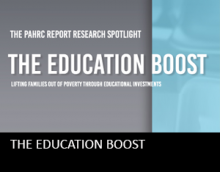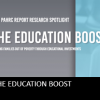0
Webinar
Community:
Feb 12, 2020
A discussion with attorney Alex Elson from the National Student Legal Defense Network and director of FAIL STATE, Alex Shebanow, to talk about predatory for-profit institutions and how that affects low income residents.
About the film:
Over five years in the making, FAIL STATE investigates the for-profit college industry and the decades-long reports of student loan abuse within the sector. The film’s central thesis: aided by a cabal of politicians, nationwide disinvestment in public colleges and universities, and an unscrupulous desire to maximize profits at all costs, for-profit colleges have exploited millions of low-income and minority students, leaving them with worthless degrees and drowning in student loan debt. With echoes of the subprime mortgage crisis, director Alexander Shebanow traces the rise of the for-profit college industry in American higher education and uncovers a story that the Los Angeles Times calls “truly eye-opening and crucial.” The film premiered to sold-out shows at DOC NYC, SXSW EDU, Cleveland International, and debuted on STARZ in December 2018. Director Alexander Shebanow and Executive Producer Dan Rather were awarded the 2019 William Randolph Hearst Award for Outstanding Professional Media Service for their work on FAIL STATE.
Authored by: CLPHA
Topics: Advocacy, CLPHA, Education, Housing Is Working Group, Legislation & Policy, Low-income, Post-secondary
 Shared by Abra Lyons-Warren
Shared by Abra Lyons-Warren
Abra Lyons-Warren posted a
on Feb 12, 2020
A discussion with attorney Alex Elson from the National Student Legal Defense Network and director of FAIL STATE, Alex Shebanow, to talk about predatory for-profit institutions and how that affects low income residents.
About the film:
Over five years in the making, FAIL STATE investigates the fo
0
News Article
Community:
May 3, 2019
That’s according to the fourth and largest survey of college students’ ability to afford food and housing
Authored by: Jillian Berman for Market Watch
Topics: Food insecurity, Low-income, Nutrition, Post-secondary, Research, Youth
 Shared by Housing Is
Shared by Housing Is
Housing Is posted a
on May 6, 2019
Jillian Berman for Market Watch
That’s according to the fourth and largest survey of college students’ ability to afford food and housing
0
News Article
Community:
Apr 4, 2019
Education Design Lab taps four large community colleges in an ambitious effort to raise single-mother completion rate 30 percent at each institution by 2024.
Authored by: Education Design Lab for Ciston PR Newswire
Topics: Dual-generation, Early childhood, Family engagement, Low-income, Metrics, Post-secondary
 Shared by Mica O'Brien
Shared by Mica O'Brien
Mica O'Brien posted a
on Apr 18, 2019
Education Design Lab for Ciston PR Newswire
Education Design Lab taps four large community colleges in an ambitious effort to raise single-mother completion rate 30 percent at each institution by 2024.
0
News Article
Community:
Mar 18, 2019
Now colleges and universities themselves are pulling together more permanent solutions, often in collaboration with local housing authorities and non-profit partners. In some cases, colleges and universities are trying to avoid losing enrollment; not surprisingly, students in unstable living environments or who can't afford food have poorer physical health, symptoms of depression and psychological stress, and are more likely to drop out, research shows.
Authored by: Charlotte West for Pacific Standard
Topics: CLPHA, Homelessness, Housing, Low-income, Partnerships, Post-secondary, West Coast
 Shared by Mica O'Brien
Shared by Mica O'Brien
Mica O'Brien posted a
on Mar 26, 2019
Charlotte West for Pacific Standard
Now colleges and universities themselves are pulling together more permanent solutions, often in collaboration with local housing authorities and non-profit partners.
0
News Article
Community:
Jan 29, 2019
Lack of transparency about SNAP benefits leaves students confused, unable to take advantage of resources
Authored by: Keagan Schlosser for The Badger Herald
Topics: Food insecurity, Low-income, Nutrition, Post-secondary, Research, Youth
 Shared by Housing Is
Shared by Housing Is
Housing Is posted a
on Feb 11, 2019
Keagan Schlosser for The Badger Herald
Lack of transparency about SNAP benefits leaves students confused, unable to take advantage of resources
0
News Article
Community:
Jan 20, 2019
Unlike elementary and secondary school students, whose families can get some support from things like federal free breakfast and lunch programs, for college students much of that assistance dries up.
Authored by: Deirdre Cohen for CBS News
Topics: Education, Food insecurity, Homelessness, Housing, Low-income, Post-secondary, Youth
 Shared by Housing Is
Shared by Housing Is
Housing Is posted a
on Jan 28, 2019
Deirdre Cohen for CBS News
Unlike elementary and secondary school students, whose families can get some support from things like federal free breakfast and lunch programs, for college students much of that assistance dries up.
0
News Article
Community:
Jan 23, 2019
On Wednesday afternoon, Durant — back home as Golden State prepared to play the Washington Wizards on Thursday night — made his way southeast, back to the old neighborhood, to appear at the grand opening of College Track at the Durant Center, whose location the Suitland native selected largely because it’s next door to that familiar McDonald’s. The after-school program, whose inaugural class includes 69 students largely from low-income families, provides study space and guidance not only through college enrollment but through graduation.
Authored by: Kent Babb for The Washington Post
Topics: East Coast, Funding, Low-income, Out-of-school time, Place-based, Post-secondary, Youth
 Shared by Mica O'Brien
Shared by Mica O'Brien
Mica O'Brien posted a
on Jan 24, 2019
Kent Babb for The Washington Post
On Wednesday afternoon, Durant — back home as Golden State prepared to play the Washington Wizards on Thursday night — made his way southeast, back to the old neighborhood, to appear at the grand opening of College Track at the Durant Center, whose location the Suitland native selected largely becau
0
News Article
Community:
Jan 9, 2019
A new government report highlights just how pervasive the problem is.
Authored by: Adam Harris for The Atlantic
Topics: Food insecurity, Low-income, Nutrition, Post-secondary, Research
 Shared by Mica O'Brien
Shared by Mica O'Brien
Mica O'Brien posted a
on Jan 9, 2019
Adam Harris for The Atlantic
A new government report highlights just how pervasive the problem is.
0
Webinar
Community:
Dec 11, 2018
CLPHA’s Education Working Group hosts a webinar including presentations on efforts from the Chicago Housing Authority to work with residents on pursuing postsecondary opportunities, as well as an update from HUD’s Office of Policy Development & Research on data collection around tracking and increasing FAFSA utilization.
Authored by: CLPHA
Topics: CLPHA, Cost effectiveness, Data sharing, Education, Funding, Housing, Housing Is Working Group, Low-income, Metrics, Midwest, Post-secondary, Research, Stability, Youth
 Shared by Mica O'Brien
Shared by Mica O'Brien
Mica O'Brien posted a
on Dec 12, 2018
CLPHA’s Education Working Group hosts a webinar including presentations on efforts from the Chicago Housing Authority to work with residents on pursuing postsecondary opportunities, as well as an update from HUD’s Office of Policy Development & Research on data collection around tracking and inc
0
Research
Community:
Dec 1, 2018
ASAP is a comprehensive program that provides students with up to three years of financial and academic support and other support services to address multiple barriers to student success, with the goal of helping more students graduate within three years. MDRC’s random assignment evaluation of CUNY ASAP found that after three years, 40 percent of ASAP students graduated compared with just 22 percent of control group students. After six years, ASAP students continued to outperform the control group, with 51 percent of the program group earning degrees compared with 41 percent of the control group.
Authored by: MDRC
Topics: Education, Low-income, Midwest, Post-secondary, Research, Youth
 Shared by Mica O'Brien
Shared by Mica O'Brien
Mica O'Brien posted a
on Dec 12, 2018
ASAP is a comprehensive program that provides students with up to three years of financial and academic support and other support services to address multiple barriers to student success, with the goal of helping more students graduate within three years.
0
Research
Community:
Dec 12, 2018
Three Ohio community colleges have successfully adapted the City University of New York’s innovative Accelerated Study in Associate Programs (ASAP), according to findings released today at Lorain County Community College in Elyria, Ohio.
Authored by: MDRC
Topics: Cost effectiveness, Low-income, Post-secondary, Youth
 Shared by Mica O'Brien
Shared by Mica O'Brien
Mica O'Brien posted a
on Dec 12, 2018
Three Ohio community colleges have successfully adapted the City University of New York’s innovative Accelerated Study in Associate Programs (ASAP), according to findings released today at Lorain County Community College in Elyria, Ohio.
0
News Article
Community:
Dec 11, 2018
A mailer sent to low-income students with that promise led to a major jump in enrollment at the University of Michigan, according to a new study.
Authored by: Adam Harris for The Atlantic
Topics: Education, Funding, Low-income, Post-secondary, Research, Youth
 Shared by Housing Is
Shared by Housing Is
Housing Is posted a
on Dec 11, 2018
Adam Harris for The Atlantic
A mailer sent to low-income students with that promise led to a major jump in enrollment at the University of Michigan, according to a new study.
0
News Article
Community:
Nov 1, 2018
Many youth experiencing homelessness report avoiding shelters because they don’t feel safe there or can’t relate to the older adults, but they often don’t have another option. It’s a problem that many jurisdictions are working to correct, understanding that although homeless youth and homeless adults have similar needs, reaching these young people may require different spaces and different strategies.
Authored by: Serena Lei for How Housing Matters
Topics: East Coast, Education, Homelessness, Housing, Low-income, Metrics, Post-secondary, Safety, Youth
 Shared by Mica O'Brien
Shared by Mica O'Brien
Mica O'Brien posted a
on Nov 1, 2018
Serena Lei for How Housing Matters
Many youth experiencing homelessness report avoiding shelters because they don’t feel safe there or can’t relate to the older adults, but they often don’t have another option.
0
News Article
Community:
Oct 16, 2018
Some community colleges have found innovative partnerships with their public housing authorities may help combat student homelessness.
Authored by: Ashley A. Smith for Inside Higher Ed
Topics: Asset building, CLPHA, Education, Homelessness, Housing, Low-income, Midwest, Pacific Northwest, Partnerships, Post-secondary, Stability, Workforce development
 Shared by Mica O'Brien
Shared by Mica O'Brien
Mica O'Brien posted a
on Oct 24, 2018
Ashley A. Smith for Inside Higher Ed
Some community colleges have found innovative partnerships with their public housing authorities may help combat student homelessness.
0
News Article
Community: Postsecondary
Oct 2, 2018
An organization is using the influence that teenagers have on their contemporaries to help more students from low-income families gain college admission and student aid.
Authored by: David Bornstein for The New York Times
Topics: Education, Low-income, Mental health, Post-secondary, Stability, Youth
 Shared by Mica O'Brien
Shared by Mica O'Brien
Mica O'Brien posted a
on Oct 9, 2018
David Bornstein for The New York Times
An organization is using the influence that teenagers have on their contemporaries to help more students from low-income families gain college admission and student aid.
0
News Article
Community:
Oct 2, 2018
Students have around 60 programs at their disposal, from advanced manufacturing to emergency medical response.
Authored by: Heather Burian for CT
Topics: East Coast, Education, Food insecurity, Health, Low-income, Post-secondary, Youth
 Shared by Mica O'Brien
Shared by Mica O'Brien
Mica O'Brien posted a
on Oct 4, 2018
Students have around 60 programs at their disposal, from advanced manufacturing to emergency medical response.
0
News Article
Community:
Jan 18, 2018
An estimated half of all college students struggle with food insecurity, even at elite flagship universities like the University of California, Berkeley, and selective private schools like Northwestern University. Former foster youth, L.G.B.T. students and students of color are at substantially increased risk. Food insecurity is strongly linked to lower graduation rates.
Authored by: Sara Goldrick-Rab
Topics: Low-income, Post-secondary, Youth
 Shared by Mica O'Brien
Shared by Mica O'Brien
Mica O'Brien posted a
on Sep 26, 2018
An estimated half of all college students struggle with food insecurity, even at elite flagship universities like the University of California, Berkeley, and selective private schools like Northwestern University. Former foster youth, L.G.B.T.
0
News Article
Community:
Jul 5, 2018
Authored by: Brittany Collins for Purpose Built Communities
Topics: Dual-generation, Education, Family engagement, Low-income, Mobility, Post-secondary, Youth
 Shared by Housing Is
Shared by Housing Is
Housing Is posted a
on Jul 11, 2018
Brittany Collins for Purpose Built Communities
0
News Article
Community:
Feb 5, 2018
Graduation rates in Arkansas have improved for all racial groups under this program
Authored by: Meredith Kolodner for The Hechinger Report
Topics: Cost effectiveness, Dual-generation, Education, Family engagement, Legislation & Policy, Low-income, Post-secondary, Racial inequalities, South, Youth
 Shared by Housing Is
Shared by Housing Is
Housing Is posted a
on Jul 5, 2018
Meredith Kolodner for The Hechinger Report
Graduation rates in Arkansas have improved for all racial groups under this program
0
News Article
Community:
Feb 15, 2018
Authored by: Jon Marcus and Matt Krupnick for The Hechinger Report (originally featured in The Atlantic)
Topics: Community development, Education, Family engagement, Low-income, Midwest, Post-secondary, Research, Workforce development, Youth
 Shared by Housing Is
Shared by Housing Is
Housing Is posted a
on Jul 5, 2018
Jon Marcus and Matt Krupnick for The Hechinger Report (originally featured in The Atlantic)
1
News Article
Community:
Jul 3, 2018
Researchers have shown — and teachers know — that schoolchildren exposed to neighborhood violence can have a tougher time learning, experiencing more stress and depression than their peers growing up in safe neighborhoods. But a Johns Hopkins University sociologist discovered that the consequences of neighborhood violence reach further than previously known, even spilling over to students who come from safe neighborhoods. Using crime and student data from Chicago, Julia Burdick-Will linked exposure to neighborhood violence to a drop in test scores, an effect that extended to students coming from communities that experienced little or no violence.
Authored by: Moriah Balingit for The Washington Post
Topics: Attendance, Child welfare, Community development, Depression, Education, Health, Low-income, Mental health, Midwest, Out-of-school time, Post-secondary, Racial inequalities, Research, Youth
 Shared by Mica O'Brien
Shared by Mica O'Brien
Mica O'Brien posted a
on Jul 3, 2018
Moriah Balingit for The Washington Post
Researchers have shown — and teachers know — that schoolchildren exposed to neighborhood violence can have a tougher time learning, experiencing more stress and depression than their peers growing up in safe neighborhoods.
0
News Article
Community:
Jul 2, 2018
Poor children don't struggle in school because of their parents. They struggle because of poverty.
Authored by: Mical Raz for The Washington Post
Topics: Attendance, Child welfare, Dual-generation, Early childhood, Education, Family engagement, Food insecurity, Grade-level proficiency, Housing, Legislation & Policy, Literacy, Low-income, Out-of-school time, Post-secondary, Racial inequalities, Research, School-readiness, Youth
 Shared by Mica O'Brien
Shared by Mica O'Brien
Mica O'Brien posted a
on Jul 3, 2018
Mical Raz for The Washington Post
Poor children don't struggle in school because of their parents. They struggle because of poverty.
0
Research
Community:
Mar 1, 2017
Authored by: The Public and Affordable Housing Research Corporation (PAHRC)
Topics: Education, Housing, Low-income, Post-secondary, Research, Workforce development
 Shared by Keely Stater
Shared by Keely Stater
Keely Stater posted a
on Jun 6, 2017
The Public and Affordable Housing Research Corporation (PAHRC)
0
News Article
Community: Youth
Authored by:
Topics: Education, Housing, Low-income, Post-secondary, Racial inequalities, South, Youth
 Shared by Housing Is
Shared by Housing Is
Housing Is posted a
on Apr 27, 2017
 Shared by Abra Lyons-Warren
on Feb 12, 2020
Shared by Abra Lyons-Warren
on Feb 12, 2020

 Shared by Housing Is
on May 6, 2019
Shared by Housing Is
on May 6, 2019


 Shared by Housing Is
on Feb 11, 2019
Shared by Housing Is
on Feb 11, 2019


 Shared by Housing Is
on Jan 28, 2019
Shared by Housing Is
on Jan 28, 2019




 Shared by Housing Is
on Dec 11, 2018
Shared by Housing Is
on Dec 11, 2018









 Shared by Housing Is
on Jul 11, 2018
Shared by Housing Is
on Jul 11, 2018

 Shared by Housing Is
on Jul 5, 2018
Shared by Housing Is
on Jul 5, 2018

 Shared by Housing Is
on Jul 5, 2018
Shared by Housing Is
on Jul 5, 2018



 Shared by Keely Stater
on Jun 6, 2017
Shared by Keely Stater
on Jun 6, 2017




